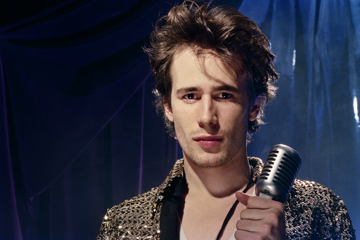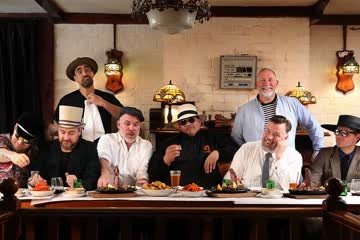Choreographer Martin Hansen Travels Through Time In 'If It's All In My Veins'
"The way we understand these great artists is only ever through certain concepts of looking back at the past."
I think, therefore I am, as Descartes famously put it. But where contemporary choreography is concerned, the relationship between thought and action is often not as clearly defined. As the medium of dance has evolved and resonated with changing creative ideals, the conceptual inspiration for a movement piece has become as important as the moves themselves, in much the same way as conceptual artists such as Damien Hirst or Tracey Emin use the physical components of their work as a means to an intellectual end.
This conceptual model is Martin Hansen's chosen approach, but the choreographer is quick to assert the enduring importance of a robust grounding in practical dance techniques. To step away from tradition, an artist must first embrace it, he believes. "I don't really see those two methods [traditional versus conceptual choreography] as existing in opposition. Dance doesn't have to be a binary state," he insists. "Conceptual work doesn't negate process orientated work. My pieces are often derived from a concept that I've developed before going into the studio, but that's just a starting point. You have to discover so much through a process of doing, like how the show will look, how the movement relates to the material. These are things that you can't just think your way through."
Hansen's If It's All In My Veins, which began its life as a shortlisted work for the 2016 Kier Choreographic Award, is a good example of this duality. An ode to the history of dance told through a distinctly conceptual process, it uses projected GIFs of great dancers from the past, such as the troubled genius and star of the Ballet Russes, Vaslav Nijinsky, or the German dance icon Pina Bausch, which three dancers then mimic.
"The way we understand these great artists is only ever through certain concepts of looking back at the past."
It's a work that poses a complex set of questions simultaneously: the implications of capturing and preserving art that exists in the ephemeral space of live performance, whether the act of recording dance divorces it from the qualities that define it, and how the awe-inspiring reputation of a particular performer can influence or warp our perception of them. At its core is an interrogation of time, and how the unstoppable march of the ages can be subverted through digital technology.
Don't miss a beat with our FREE daily newsletter
This work gives the audience plenty to think about, but despite its cerebral creds, there's also a tangibly romantic quality to the ideas Hansen has woven into If It's All In My Veins. "The way we understand these great artists is only ever through certain concepts of looking back at the past. Their legacy and significance and memory is always changing - they're not these solid, immutable truths because their work is always being considered within the conditions of the present. It's this constant process of being re-written, re-imagined, idolised. So using GIFs felt like a very direct way of exploring that idea," Hansen shares.
There's also a revealing irony in Hansen's exploration of the great dance innovators of the past. These titans of the art form, now firmly installed in the pantheon of creative visionaries, were once considered, and in some instances even dismissed, as creative crackpots, mauling the traditions of dance more than enriching them. While attitudes towards those past masters have thawed in the ensuing decades, there remains a level of hostility towards artists like Hansen, working on the bleeding edge of an artistic practice. The new and experimental can often be written-off as pretentious, inaccessible or just plain weird by those disinclined to engage with anything but the reassuringly familiar.
So why choose to work in a vernacular that's often deemed too difficult for mainstream audiences? "It's incredibly personally important," Hansen replies. "These are subjects that I think about constantly and that occupy me a lot. I had a very traditional training — I went through ballet school and then the VCA, and I still work as a professional dancer — so in another life, I might very well have made work that was more traditional. But that's just not what interests me. As banal and silly as it sounds, my experience of time in the world is something that continuously perplexes me. It spins me out how, as dancers, we reproduce history, so I find myself continuously inspired to challenge and explore that idea. There's no fame or money in contemporary dance, but it is, for me at least, still very rewarding."
Martin Hansen presents If It's All In My Veins, 23 — 26 Mar at Dancehouse, part of Dance Massive.







